- Home
- Mark Lawrence
King of Thorns Page 33
King of Thorns Read online
Page 33
It took a while. Long enough for my throat to grow raw and my voice to crack, but in the end a glow approached. The swinging glow of a lantern.
“You get one chance to shut your mouth, boy. After that—”
“You’re going to shut it for me?” I asked, pressed close to the door.
“Oh, you’d like that, wouldn’t you? For me to open the door. I heard about you and Master Shimon. I wouldn’t open that door for a gold coin. No. You shut your mouth or you’ll discover you’ve taken your last drink of water on God’s earth.”
“Hey, don’t be like that. I’m sorry.” I reached up and dropped my watch so that it fell into the basket made by the window cage. “Look, take this, it’s worth a hundred coins. Just bring me something good to eat would you?”
I crouched low. Listening. Listening.
The gaoler stepped in to take the bait and bang, I slid my arm out through the feeding slot at the base of the door, skinning my elbow, and caught him behind his ankle. A sharp yank and he fell. I took a firmer grip hauling his foot toward the slot, but he didn’t struggle.
“Damn.”
The bastard had hit his head and knocked himself senseless. I’d been planning to reduce the number of his toes with my knife until he offered me his key. It’s hard to intimidate an unconscious man.
I picked up my dead rat. Still warm.
There are quite a few uses for a dead rat. I’ll go into them at another time. The use I had in mind proved difficult. It turned out to be harder to make a dead rat scurry again than it did to set Brother Row diving in the mud. It’s hard to understand a rat, to wear its skin. I almost gave up but when I focused on hunger, it twitched in my hands. It turns out that being dead doesn’t stop a rat thinking about its next meal. Before too long I had the creature marching to my tune, and I pushed it out through the food slot.
In the light of the gaoler’s lantern, which helpfully he had hung on a hook before reaching for my watch, I sent the rat out searching.
I sat in the small blob of rat brain telling it to gnaw on the thong holding the ring of keys to the gaoler’s belt. When the key ring came loose I had the rat drag it to me. In a truly secure cell you wouldn’t be able to unlock from the inside, but all systems have their flaws. I let the rat die again and stepped out into the corridor, a free man after my long hours of incarceration!
My stomach clenched but it didn’t feel as if I was dying; a touch lightheaded, a touch unclean, but necromancy will do some of that for you in any case. If I had been poisoned then whoever did it had done a bad job.
I gagged the gaoler with strips of cloth and locked him in my cell. Glancing into the other cells along the corridor it appeared that my grandfather was not the locking-up sort. That meant he was either very keen on executions or that he ruled with a light touch.
Slow steps took me to the gaoler’s desk where the ceiling port let the moonlight in. It was late but perhaps not midnight. I had had some time to think and I kept thinking. If I were going to poison my enemies I wouldn’t waste my efforts on thirty guardsmen, I’d try to empty the throne and throw the whole place into confusion. But any kind of poisoning is hard to do. Castle kitchens are well watched, the cooks as trusted as the men who shave the royal throat. Fresh provisions are hard to taint, potatoes, carrots, and the like. Dry provisions are bought incognito and escorted to locked pantries.
I left the dungeons. I still wore the household uniform and the single guard at the exit had been obliging enough to let me knock his head against the wall. Unfortunately a burned face is hard to hide. You can’t present your good side to the whole world. I found a window and took to the rooftops.
Sitting against the main chimney stack, legs stretched out across the terracotta tiles of the great hall’s roof, I pondered.
Not the slugs—sorry, snails. I didn’t partake. So the rice. But poisoning rice? The water and boiling and draining would soak it all away. So the saffron. But that would be purchased from whatever ship next turned up at harbour with stocks on board. How often does a household run out of a spice that costs more per ounce than gold? How many ships carry it? What households other than those of the Hundred would buy such luxury in any case? Bundle all those factors together…what would the odds be…what probabilities would emerge? Just thinking about the necessary calculations made my head hurt.
Qalasadi!
I slid down the slope of the roof, hoping no tiles would come with me. I reached the wide stone gutter and edged across it, looking for a place where it was well supported. Ending my reign as king in a gory splat at the bottom of a seventy-foot drop was no part of my ambitions. I could hear muffled voices from several quarters, the sigh of the ocean, waves lapping the foot of the cliffs, and the relentless buzz and chirp of the night insects that haunt the Horse Coast.
Castle Morrow bakes in the southern sun much of the year. The winters can be ferocious but are rarely cold. There may well be old men in the region who have never seen snow. In consequence the windows are large and unscreened, the storm-shutters heavy and locked open from early spring to late autumn. With a firm grip on the gutter’s edge and my left ankle locked under the bottom row of tiles, I hung upside-down and looked through a high window into the great hall.
The far end of the single long table had been set with silver and crystal. Wall lamps burning smokeless oil gave a welcoming glow. A servant brought in three decanters of wine, two white, one red. Elite house guards in plumed finery stood watch at six points around the hall.
The servant left. Minutes passed. The blood ran to my head, my eyeballs began to prickle and itch, my fingers grew numb where they gripped the stonework. I heard noise down in the courtyard below. A quick commotion. I decided not to move. Silence returned.
At last the black oak doors opened and two servants stepped through to hold them wide as my uncle walked in, escorting Lady Agath. They took their seats, maids now attending to pull the chairs out and settle the nobility. Two more ladies followed in. Old biddies I recognized from the Ladies’ Hall. A young man with a fat gut strode in, wrapped in blue velvet despite the heat. My grandmother, who I saw once at the Tall Castle, came escorted and supported by a pageboy. She looked unsteady, her hair very white, her skin pale, thin, drawn. Then my grandfather, taking his high-backed chair at the head of the table. Earl Hansa surprised me; he looked only a little older than my father, a solidly built man with a short grey beard and long thick hair still streaked with black.
More servants now, bearing covered silver platters.
A drop of sweat left my nose and fell away into the darkness. My head felt fuzzy and full of blood.
The covers came away in a choreographed move, flourished overhead by the servants, and revealing today’s delicacies. No snails. No rice.
I slid with less grace than I had hoped and swung clumsily into the window, sitting on the ledge and steadying myself with both hands. I very nearly ended up in the unplanned splat. Hanging upside-down before attempting acrobatics is not to be recommended.
I had hoped to go unnoticed a while longer but perhaps Lady Agath was the only person in the great hall not to look up.
To his credit, while the fat boy jumped to his feet, and several of the ladies shrieked, Lord Robert called for the house guard to shield the Earl. The Earl Hansa himself took a sip from his wine then called out, “I had a grandson named William Ancrath.”
“And I had a brother of that name,” I called back.
My uncle stood up at that.
I released the edges of the window. With a quick motion I threw my dagger. It struck the centremost platter and yellowed slices of potato sprinkled with sea-salt and crushed black peppercorns leapt across the table. The spider bite had left my finger joints sore and swollen and the knife went far closer to one of the old women’s ears than I had intended.
More shrieks. “It’s that damnable boy!” Lady Agath cried, having finally laid eyes on me.
“You don’t approve of our meal arrangements…Nephew?�
� Lord Robert asked.
“I think if you ate the contents of that platter I might soon be lacking relatives in the south. In fact, I could even be legal heir to the earldom!”
“You’d better come down here, Jorg,” my grandfather said.
To my shame I had to be helped down with a ladder. The drop would have broken my legs and the inner walls of the great hall were plastered smooth. Clambering down a ladder arse first to the room wasn’t the most impressive of entrances, but I had just saved their lives.
“You think our food is poisoned?” Grandfather asked.
I took a silver fork and speared a slice of the potato. “Have Qalasadi brought here and see if he would like a taste.”
Lord Robert frowned. “Just because we’re at odds with Ibn Fayed doesn’t mean all Moors are out to get us.”
Earl Hansa nodded to the guardsman at his shoulder and the man set off on an errand.
“Even so, he is guilty,” I said. “And in such a manner that there is no proof other than to see if he will sample a little of your saffron.”
“The saffron?” the Earl asked.
“You’ll find you’ve recently had a new consignment come to the kitchens, properly sealed and kept safe both for its intrinsic value and for your protection. It is probably part of a larger supply that is busy killing rich folk up and down the coast. A seemingly random act of pointless destruction. But I know a man capable of calculating that part of this same consignment would end up on your table, Earl Hansa. A man who also knew my identity and thought I’d make a perfect villain, and that I would accept the blame with the good graces of my line.”
“Dig a deeper hole with your sword, you mean?” Lord Robert asked, a slight smile on his lips.
For a moment I wondered if Qalasadi had factored in even my arrival, wondered if I were not some chance victim to pin his crime on but part of some larger calculation. I pushed that thought aside as both unlikely and unsettling. “Our mathmagician made only one mistake. It’s unfair perhaps to even call it a mistake. I expect he considered the possibility and decided it remote enough to chance. He didn’t think it likely you would let the cooks waste such fine ingredients on mere guards.”
The man who left on Grandfather’s errand returned. “Qalasadi is not in his quarters, Earl Hansa, and neither is he in the observatory.”
It turned out Qalasadi left the castle as soon as news of the guards’ sickness reached him.
FROM THE JOURNAL OF KATHERINE AP SCORRON
March 26th, Year 99 Interregnum
Rennat Forest. Late afternoon.
I had thought I might write about Hanna at her graveside. Sareth says I take this journal everywhere, that I have too little in my life if I can’t be without it. People who are truly living, she says, don’t need to write about it every minute—they’re too busy getting on with real things. But Sareth hasn’t left the Tall Castle in a year, and whilst that baby is sucking the milk out of her I’m sat in Rennat Forest with monsters!
There’s an ogre at least ten foot tall with a mouthful of sharp teeth and slit-eyes. It glanced my way at first but now it just stands carving a chunk of deadfall, not with a knife but with the black nail on a finger as thick as my wrist.
The second monster is just a little boy really. A skinny one but nearly naked and marked with patterns in red and black, like ripples or flames. He scampers from bush to bush, trying to keep hidden, watching me with big black eyes. When he runs you can see his claws.
I’m distracting myself. I don’t want to think about what Jorg said.
The monster-child is called Gog. He says Jorg named him, after those giants in the bible. I told him there should be a Magog too. He looked so sad at that and the forest felt too hot all of a sudden as if it were the highest of high summers.
“And what will you be when you grow up, Gog?” I asked him to take his mind from whatever had upset him.
“I want to be big and strong,” he said. “To make Jorg happy. And I want to be happy, to stop Gorgoth being sad.” He looked at the ogre.
“And what do you want for you?” I asked him.
He looked at me with huge black eyes. “I want to save them,” he said. “Like they saved me.”
Jorg’s men look as though they’ve never left the road. They’re bandits, not a king’s retinue. Sir Makin, who they say is a proper knight, is as filthy as the rest. There’s dried muck all over his armour and he stinks like a sewer. He has a way with him though, even with the dirt. Sir Makin has manners at least.
The one they call Red Kent tries to be polite, my lady this and my lady that, bowing at every turn. It’s quite comical. When I thanked him for the water he brought me he blushed from neck to hairline. I think I know how he got his name.
When he’s not waiting on me Kent spends most of his time whittling, carving away with his back against a tree and a black knife in hand. It’s a wolf he’s working on. It looks as though it’s climbing out of the wood, snarling at the world. He said he was a woodsman once. A long time ago.
And there’s a boy, Sim. Very delicate features like that stage player who performed in court last week. He looks kind, but shy. He won’t speak to me but I see him looking when he thinks I can’t see. He’s the cleanest of all of them. I can’t think he would be much of a warrior. Surely he’s too slight to swing that sword of his.
I know Sir Makin can fight. I remember that he put Sir Galen to the test when Jorg’s father set them against each other, though I think my Galen would have beaten him. Perhaps that’s why Jorg pushed over Sageous’s tree. To save Sir Makin.
The other two, the two Jorg warned Red Kent to watch, are killers through and through. You can see it in their eyes. There’s a giant called Rike who’s nearly as tall as the ogre and as broad as a Slav wrestler. He just looks angry the whole time. And there’s an old man, maybe fifty, skinny, gristly, with grey stubble on his chin and as wrinkled as Hanna was. They call him Row and he has kind eyes, but there’s something about him that says his eyes are lying.
And I’m sitting here scratching the paper with my quill to record rogues and vagabonds because my hand doesn’t want to follow where Jorg has gone, or to write what he might be doing, or to frame the words that are pounding through my head.
I tried to stab Jorg but it was like a dream. I both knew and did not know what my hand was doing. I didn’t want to hear his pain or see him bleed. I don’t recall picking up the knife to take with me. I told myself to stop. But I didn’t stop.
And now. If I had Friar Glen here. I would want to hear his pain and see him bleed. I would not tell myself to stop. But I would stop. Because for the first time in a long while my head feels clear, my thoughts are all my own, and I am not a killer.
March 27th, Year 99 Interregnum
Rennat Forest. Before noon. A high wind in the trees.
Sir Makin has been pacing. He doesn’t say it but he’s worried about Jorg. We saw a patrol ride by earlier, between the fields. They’ll be looking for me. Sir Makin says the more of them looking for me, the fewer for Jorg to worry about in the castle.
The big one. The huge one, really. Rike. He’s been saying they should go. That Jorg is captured or dead. Kent says Jorg helped them all escape the dungeons and if he’s stuck there in those same dungeons himself, they should go free him. Even Sir Makin says that’s madness.
The night was cold and noisy. They gave me their cloaks, but I’d rather be cold than under those stinking, crawling things. Everything moves in the forest at night, creaking, or croaking, or rustling in dead leaves. I was glad to see the dawn. When I woke up, the boy, Sim, was standing against the tree beside me, watching.
Breakfast was stale bread and bits of smoked meat. I didn’t like to ask what animal it came from. I ate it. My stomach was grumbling and I’m sure they could hear.
Jorg has come back. His men are more scared now than when they thought he was lost. He’s a wild thing, his hair torn and spiky with blood, he won’t look at anything, his eyes keep s
liding, he can hardly stand. He’s got blood on his hands, past his elbows, his nails are torn, two of them missing.
Makin told him to sleep and Jorg just made this terrible sound. I think it might have been laughing. He says he won’t sleep again. Ever. And I believe him.
Jorg keeps moving, fending off trees with his hands, colliding with whatever’s in his way. He says he’s been poisoned.
“I can’t clean them,” he said. And he showed me his hands. It looks as though he’s rubbed the skin off.
I asked him what was wrong and he said, “I’m cracked through and filled with poison.”
He scares his men and he scares me too. Of all of us I am the one his eyes avoid the most. His eyes are red with crying but he doesn’t cry now, just a kind of dry hacking sob.
My great aunt got a madness in her. Great Aunt Lucin. She must have been sixty, a small woman, plump, we all loved her. And one day she threw boiling water over her handmaid. She threw the water and then went wild, spouting nursery rhymes and biting herself. Father’s surgeon sent her to Thar. He said there was an alchemist there whose potions might cure her. And failing the potions, he had other methods. The surgeon said that this man, Luntar, could take out pieces of a person’s mind until what remained was healthy.
My great aunt Lucin came back in a carriage two months later. She smiled and sang and could talk about the weather. She wasn’t my great aunt Lucin any more but she seemed nice enough, and she didn’t scald any more maids.
I don’t want that for Jorg.
Jorg has told his men to kill me, and some of them seem ready to do it. Rike looks keen. But Sir Makin has said Jorg doesn’t know his mind and they are to leave me alone.
Jorg is saying he needs to kill Sareth too. He says it’s a kindness. He’s insistent. Kent and Makin had to wrestle him to the floor to stop him running back to the castle to do it. Now he’s lying in the dirt watching me. He keeps telling me what they do to men in his father’s dungeons. It can’t be true, any of it. It makes me sick to hear. I can taste vomit at the back of my throat.

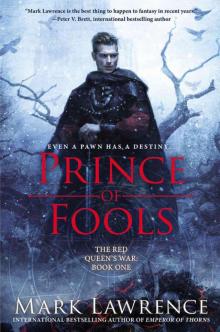 Prince of Fools
Prince of Fools Vodka Politics: Alcohol, Autocracy, and the Secret History of the Russian State
Vodka Politics: Alcohol, Autocracy, and the Secret History of the Russian State Holy Sister
Holy Sister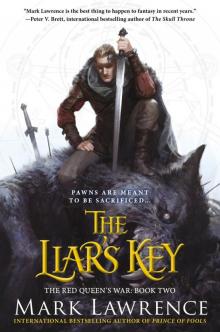 The Liar's Key
The Liar's Key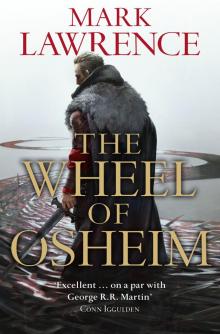 The Wheel of Osheim
The Wheel of Osheim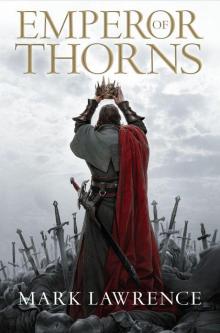 Emperor of Thorns
Emperor of Thorns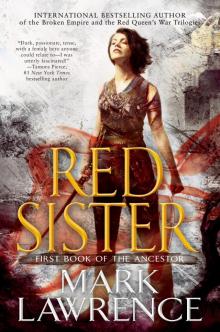 Red Sister
Red Sister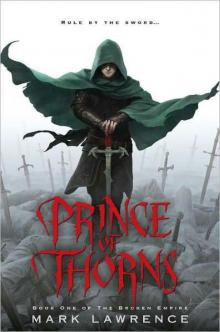 Prince of Thorns
Prince of Thorns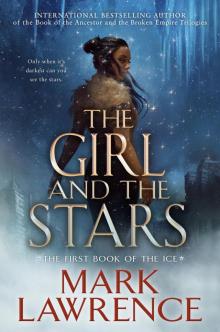 The Girl and the Stars
The Girl and the Stars Dispel Illusion (Impossible Times)
Dispel Illusion (Impossible Times)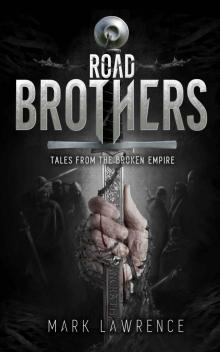 Road Brothers
Road Brothers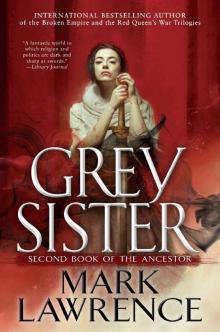 Grey Sister
Grey Sister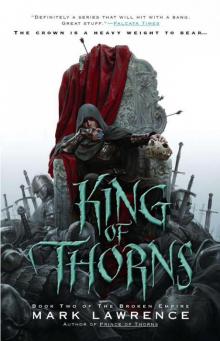 King of Thorns
King of Thorns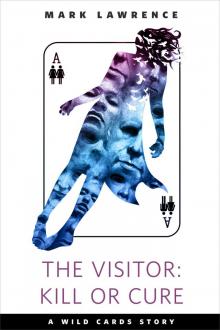 The Visitor--Kill or Cure--A Tor.com Original
The Visitor--Kill or Cure--A Tor.com Original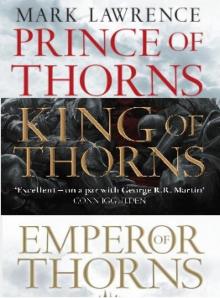 The Broken Empire Trilogy Omnibus
The Broken Empire Trilogy Omnibus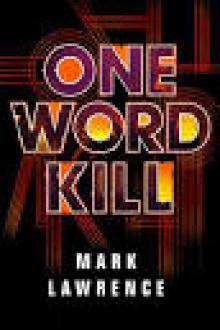 One Word Kill (Impossible Times Book 1)
One Word Kill (Impossible Times Book 1)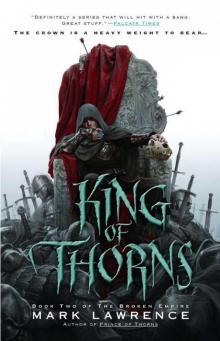 King of Thorns be-2
King of Thorns be-2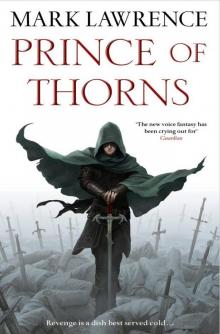 Prince of Thorns tbe-1
Prince of Thorns tbe-1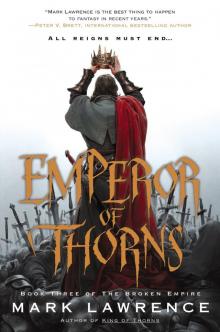 Emperor of Thorns tbe-3
Emperor of Thorns tbe-3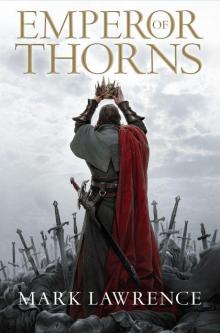 Emperor of Thorns (The Broken Empire, Book 3)
Emperor of Thorns (The Broken Empire, Book 3)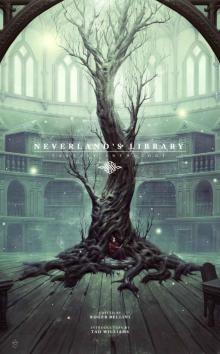 Neverland's Library: Fantasy Anthology
Neverland's Library: Fantasy Anthology